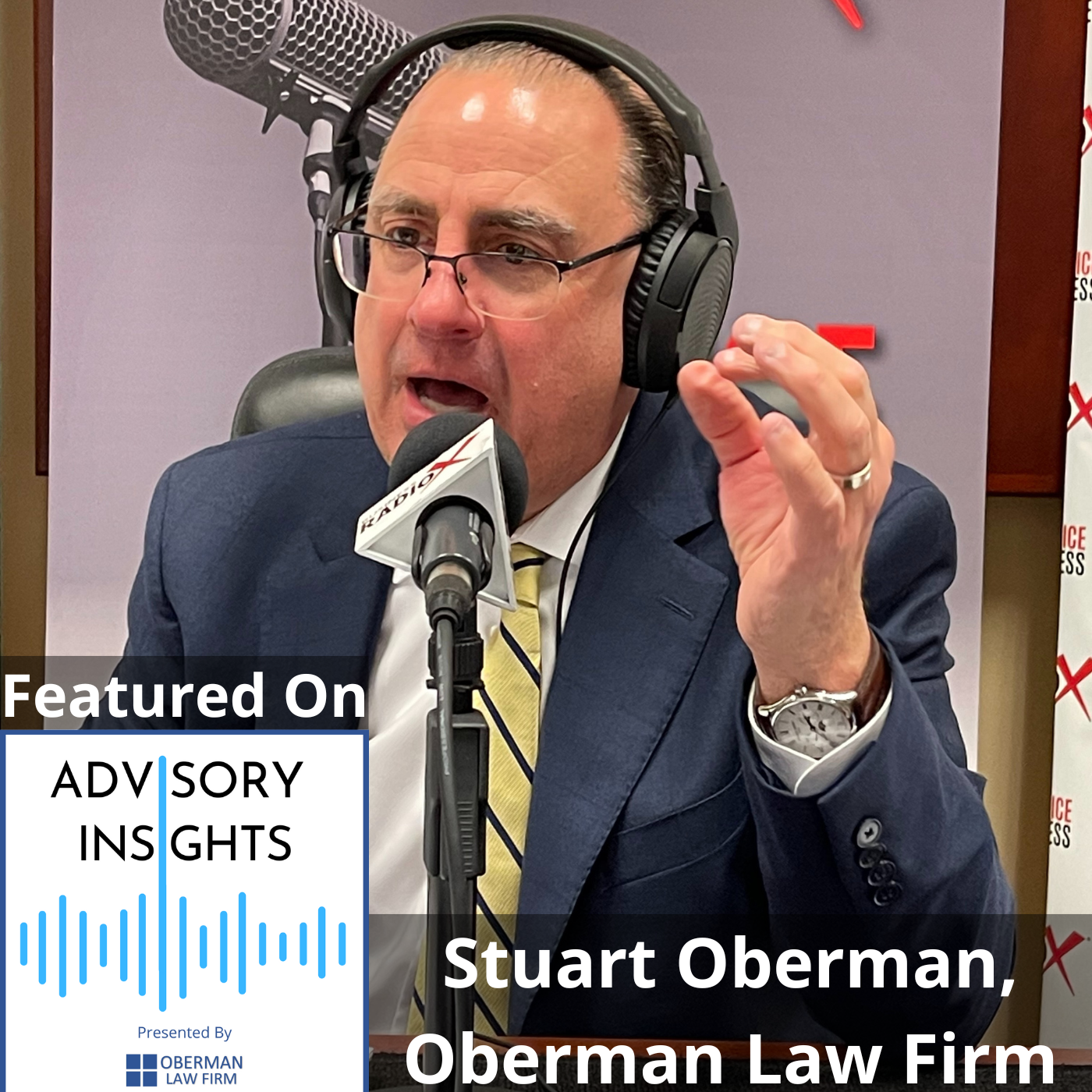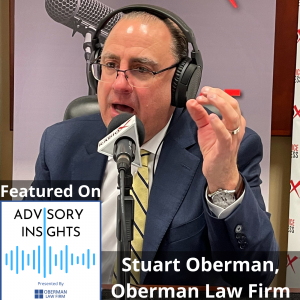
FTC Proposed Ban on Non-Compete Agreements (Advisory Insights Podcast, Episode 31)
On this episode of Advisory Insights, Stuart Oberman of Oberman Law Firm discussed the Federal Trade Commission’s (FTC) proposed ban on non-compete agreements. Stuart talked about how this ban, if enacted, would extend to nearly all work arrangements, including unpaid or volunteer positions, apprentices, and independent contractors, in addition to regular employees.
Advisory Insights is presented by Oberman Law Firm and produced by the North Fulton studio of Business RadioX®. The series can be found on all the major podcast apps. You can find the complete show archive here.
TRANSCRIPT
Intro: [00:00:01] Broadcasting from the Studios of Business RadioX, it’s time for Advisory Insights. Brought to you by Oberman Law Firm, serving clients nationwide with tailored service and exceptional results. Now, here’s your host.
Stuart Oberman: [00:00:20] Hello everyone, and welcome to Advisory Insights. Your host, Stuart Oberman, here. All right. Folks, we’re going to gear it up pretty quick on this one. As a firestorm continues, this episode, FTC Proposed Ban on Non-competes.
Stuart Oberman: [00:00:37] So, on our previous episode, we talked about some companies the FTC sort of slapped a little bit, if you will, in relation to their January 4, 2023 press release from the FTC. But now, I want to talk about the Biden Administration’s proposed ban on non-competes.
Stuart Oberman: [00:00:58] Look, I don’t care what your politics is. It doesn’t matter to me. I don’t care who you vote for. I don’t care what you do behind closed doors. It doesn’t matter to me. But what I’m looking at is we have to look at the cards that are on the table. Again, this is not politics. This is purely, purely law.
Stuart Oberman: [00:01:22] So, under the Biden Administration’s request, the FTC is looking into banning non-compete agreements. So, what does that mean? I’m going broad scope here. The FTC’s proposal would extend to nearly all work arrangements, including – got to get this, including -unpaid or volunteer positions, apprentices, independent contractors, in addition to regular employees. Now, that is extremely broad-based.
Stuart Oberman: [00:01:58] So, I don’t want to go too far in detail because there’s a lot of things that are going to go into this. There’s a lot of public notices that have to go out. But what I want to do is point out the extreme necessity that our employers need to look at regarding this non-competes.
Stuart Oberman: [00:02:15] So, under the rule, under the proposed rule, employers would be required – not optional, required – to rescind previously entered non-compete provisions and – get this – inform workers in writing via letter, email, text message that their agreement is no longer in effect or even enforceable.
Stuart Oberman: [00:02:45] Now, if you’ve got a large company with thousands and thousands of employees, under this rule – again, nothing’s etched in stone. There’s a lot of commentary. There’s a lot of things that we’re looking at. You got to look at the executive order and what that is exactly directing the FTC to do – employers would be required to rescind previously non-compete provisions and inform workers in writing, via letter, email, text message – assuming that everyone reads their emails and gets the emails – that the agreement is no longer enforceable.
Stuart Oberman: [00:03:25] So, a couple of carve outs. The proposed rule could potentially not apply to franchisee or franchise agreements or – and this is critical. This goes to the M&A field, mergers and acquisitions – agreements between buyers and sellers of a business. That’s a carve out, because if you look at what those buy-sell agreements are, they’re actually valuable consideration for those. So, if you’re paying someone $50 or $50 million to buy it out, you’ve got some kind of consideration. That’s a whole nother legal issue.
Stuart Oberman: [00:04:05] But both of these agreements would be continued to remain subject to, of course, antitrust laws, but wouldn’t necessarily affect the rule. So, I think those are two extremely carve outs, especially when we’re looking to buy-sell agreements. Now, that can be businesses, professional mergers and acquisitions.
Stuart Oberman: [00:04:27] So, last year, as a firm, we did about 135 transactions with about 350 million total dollar amount. So, I can see why that would be a carve out exception. But one thing to look at is, first and foremost, this rule doesn’t go into effect for many, many months. There’s a lot of commentary. And I don’t know that we want to waste a whole lot of time on what-could-be’s and a whole lot of Sunday morning talk show it matters. But what I want to do is put this in forefront of you’ve got to look at what you’re doing on a daily basis going forward.
Stuart Oberman: [00:05:04] So, first, I will guarantee you that if this law goes into effect, there’s going to be numerous legal challenges. There’s just going to be legal challenges. First, does this, in fact, exceed the FTC’s permission – I mean, authority within rulemaking authority under the Federal Trade Commission Act, first and foremost? That’s an issue. Then, under that act, you’ve got, of course, potential delegation clause. What does that look like?
Stuart Oberman: [00:05:30] And second, the rule making may very well invade the state’s province of contract law. So, we’ve got state issues to look at. And then, under the third provision, it may trigger major question doctrine, whether or not the ban would have to be something that would undertake by Congress, and not the FTC, as an executive rule.
Stuart Oberman: [00:06:03] Again, I’m going to repeat that. We have to look at whether or not this action, the ban would actually come under Congress’s authority and not the FTC. Again, a couple issues. So, we’ve got to look at what’s going on with the ban months away, a lot of commentary. I’m sure there’s going to be tweaks and challenges along the road.
Stuart Oberman: [00:06:30] Again, I don’t want to get into politics here, but we’ve got to look at what we have to look at. Then, we’re going to look into three areas that we say that it may not be enforceable. So, again, I want to put this on the forefront of our employers on state, local, national, and international level as to what’s to be expected.
Stuart Oberman: [00:06:50] Folks, that’s all I’m going to comment today – maybe not tomorrow, but today on non-compete agreements and the FTC ban. Folks, Stuart Oberman here, your host. Thanks again for joining us on Advisory Insights. If you have any questions, give us a call, 770-886-2400. Or send me an email, stuart, S-T-U-A-R-T, @obermanlaw.com. Folks, thanks for joining and have a fantastic day.
Outro: [00:07:16] Thank you for joining us on Advisory Insights. This show is brought to you by Oberman Law Firm, a business-centric law firm representing local, regional, and national clients in a wide range of practice areas, including health care, mergers and acquisitions, corporate transactions, and regulatory compliance.
About Advisory Insights Podcast
Presented by Oberman Law Firm, Advisory Insights Podcast covers legal, business, HR, and other topics of vital concern to healthcare practices and other business owners. This show series can be found here as well as on all the major podcast apps.
Stuart Oberman, Oberman Law Firm

Stuart Oberman is the founder and President of Oberman Law Firm. Mr. Oberman graduated from Urbana University and received his law degree from John Marshall Law School. Mr. Oberman has been practicing law for over 25 years, and before going into private practice, Mr. Oberman was in-house counsel for a Fortune 500 Company. Mr. Oberman is widely regarded as the go-to attorney in the area of Dental Law, which includes DSO formation, corporate business structures, mergers and acquisitions, regulatory compliance, advertising regulations, HIPAA, Compliance, and employment law regulations that affect dental practices.
In addition, Mr. Oberman’s expertise in the healthcare industry includes advising clients in the complex regulatory landscape as it relates to telehealth and telemedicine, including compliance of corporate structures, third-party reimbursement, contract negotiations, technology, health care fraud, and abuse law (Anti-Kickback Statute and the State Law), professional liability risk management, federal and state regulations.
As the long-term care industry evolves, Mr. Oberman has the knowledge and experience to guide clients in the long-term care sector with respect to corporate and regulatory matters, assisted living facilities, continuing care retirement communities (CCRCs). In addition, Mr. Oberman’s practice also focuses on health care facility acquisitions and other changes of ownership, as well as related licensure and Medicare/Medicaid certification matters, CCRC registrations, long-term care/skilled nursing facility management, operating agreements, assisted living licensure matters, and health care joint ventures.
In addition to his expertise in the health care industry, Mr. Oberman has a nationwide practice that focuses on all facets of contractual disputes, including corporate governance, fiduciary duty, trade secrets, unfair competition, covenants not to compete, trademark and copyright infringement, fraud, and deceptive trade practices, and other business-related matters. Mr. Oberman also represents clients throughout the United States in a wide range of practice areas, including mergers & acquisitions, partnership agreements, commercial real estate, entity formation, employment law, commercial leasing, intellectual property, and HIPAA/OSHA compliance.
Mr. Oberman is a national lecturer and has published articles in the U.S. and Canada.
Oberman Law Firm
Oberman Law Firm has a long history of civic service, noted national, regional, and local clients, and stands among the Southeast’s eminent and fast-growing full-service law firms. Oberman Law Firm’s areas of practice include Business Planning, Commercial & Technology Transactions, Corporate, Employment & Labor, Estate Planning, Health Care, Intellectual Property, Litigation, Privacy & Data Security, and Real Estate.
By meeting their client’s goals and becoming a trusted partner and advocate for our clients, their attorneys are recognized as legal go-getters who provide value-added service. Their attorneys understand that in a rapidly changing legal market, clients have new expectations, constantly evolving choices, and operate in an environment of heightened reputational and commercial risk.
Oberman Law Firm’s strength is its ability to solve complex legal problems by collaborating across borders and practice areas.
Connect with Oberman Law Firm:
Company website | LinkedIn | Twitter
















